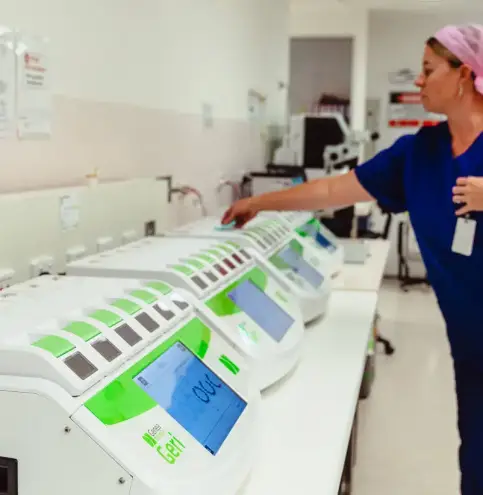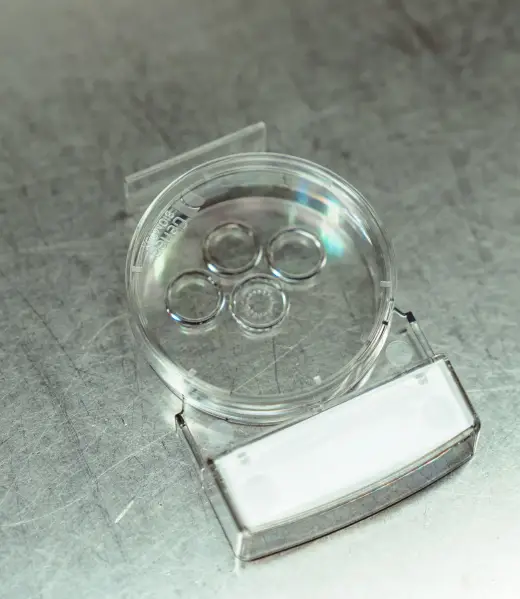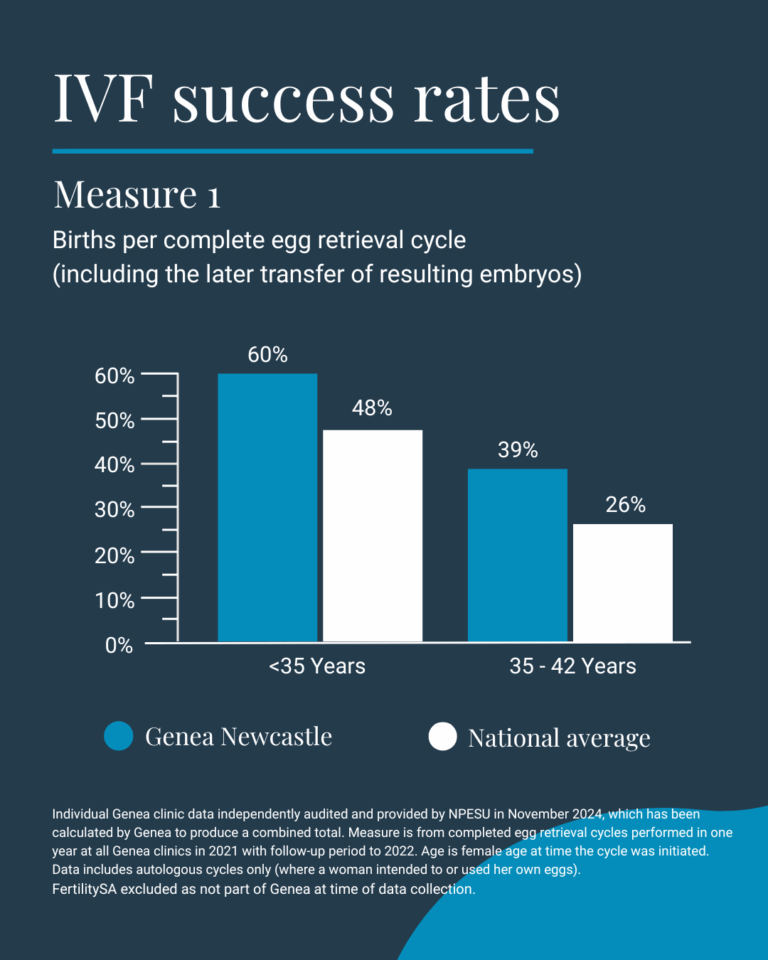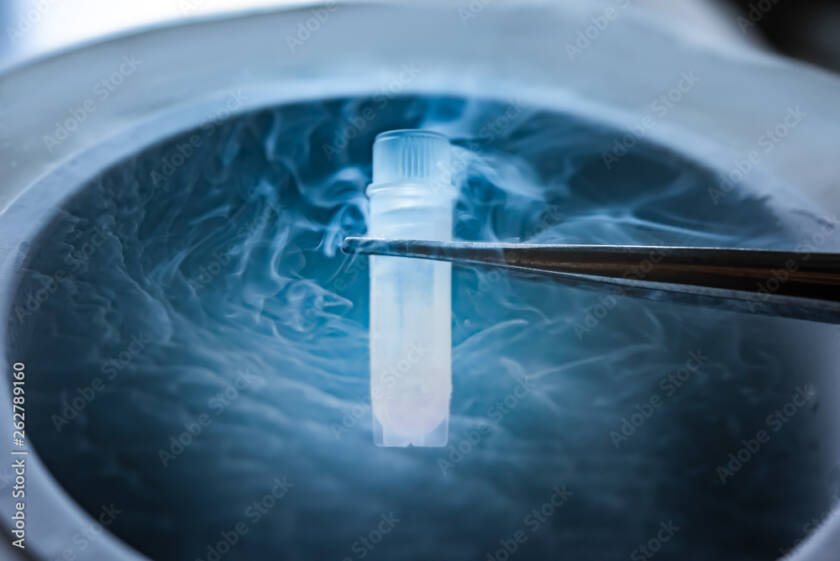
Infertility factors are only female-related 40% of the time.


What causes infertility?
What are some possible male causes of infertility?
In the man, one infertility problem — which is often treated surgically — is damage to the vas deferens.
Often, this is caused by a sexually transmitted disease, another infection, or a vasectomy (male sterilisation).
In some cases, a woman may not be able to become pregnant with her partner because he can’t ejaculate normally during sex — or because the vaginal mucus can’t support the sperm and they have to bypass the vagina, or for other reasons.
In these cases, through artificial insemination, the semen is placed into the woman’s uterus or vaginal canal using a hollow, flexible tube called a catheter.
What can you do to treat ovulation disorders?
Ovulation induction with controlled ovarian stimulation is a lighter form of treatment we might recommend for women who have normal tubes, but who rarely or never ovulate (and assuming their partners have a normal semen analysis).
For women who do ovulate regularly, stimulation can also be used to boost the chance of pregnancy by increasing the number of follicles that develop fully — and therefore the number of eggs produced. Two types of hormones may be used: tablets of clomiphene citrate (Clomid® or Serophene®) and injections of follicle stimulating hormone, or FSH (Gonal-F® or Puregon®).
Fertility drugs are also often recommended for women with ovulation problems. First, we’ll discuss the benefits and side-effects of each. Note that multiple births occur in 10-20% of the cases when fertility drugs are used.
If drugs aren’t the answer, surgery may be. Because major surgery is involved, operations to repair damage to the woman’s ovaries, fallopian tubes, or uterus are recommended only if there is a good chance of restoring fertility.
Drugs or surgery are used to treat infertility in 80-90% of cases.
Assisted Reproductive
Technologies
Because infertility causes vary from couple to couple, there are many different Assisted Reproductive Technologies (ART). Depending on what the tests turn up, different treatments are recommended. Here are the IVF and Assisted Reproductive Technologies treatments we offer:
IVF
IVF makes it possible to combine sperm and eggs in a laboratory for a baby that is genetically related to one or both partners. It is often used when a woman’s fallopian tubes are blocked, or when a medical reason for infertility cannot be found.
During this process, medication is given to stimulate the ovaries to produce multiple eggs. Once mature, the eggs are removed from the ovaries (1) and placed in a laboratory culture dish with the man’s sperm for fertilisation (2). The dish is then placed in an incubator (3). Five days later, one embryo is transferred to the woman’s uterus (4). If you don’t become pregnant, you may try again in the next cycle.
Donor egg IVF
For women who, for example, have impaired ovaries or carry a genetic disease that can be transferred to the offspring. Eggs are donated by another healthy woman and fertilised in the lab with the male partner’s sperm before being transferred to the female partner’s uterus.
In both cases, excess embryos are frozen, to be thawed in the future if you don’t get pregnant on the first cycle or you decide to have another baby.
IVF Treatment with Genea Newcastle
Dr Holland is affiliated with Genea Newcastle. Genea Newcastle operates from Lingard Private Hospital at Merewether, where the IVF clinic has been operating since 1984. Genea Newcastle receives referrals from more than 2500 GPs and specialists from the Hunter and across Australia per year.
In fact, data compiled by the Australian and New Zealand Assisted Reproduction Database (ANZARD) shows that — in just one year — we improved our success rates compared to other clinics from a 30% to a 40% greater chance of taking home a healthy baby.
(ANZARD conducts an annual review of IVF in Australia and New Zealand and we believe it is the only true independent basis for comparison.)

Why should I do IVF with Genea?
Put simply, Genea Newcastle are fertility pioneers. Our research and technologies virtually doubled IVF success rates for patients in the mid-nineties and our constant search for innovations and breakthroughs continues to improve outcomes today.
In fact, data compiled by the Australian and New Zealand Assisted Reproduction Database (ANZARD) shows that — in just one year — we improved our success rates compared to other clinics from a 30% to a 40% greater chance of taking home a healthy baby.
(ANZARD conducts an annual review of IVF in Australia and New Zealand and we believe it is the only true independent basis for comparison.)
Genea's Landmark IVF Advancements
Routine Day 5 embryo transfers
Growing the embryos in the lab a little longer before transferring them to the female lets us determine which embryos have the highest development potential and increases success rates. The time between Day 3 and Day 5 in an embryo’s life is critical because it’s when an embryo switches genetic control from the female’s genome to shared control between the female and male. This can be a point in the development of the embryo where problems occur and waiting to transfer embryos beyond it is far more successful.
For years, our patients have enjoyed world-leading success rates with this advancement, and other Australian clinics have only recently followed our lead.
Single embryo transfers
Vitrification
Genea also led the way in developing and routinely replacing the old slow-freezing method for embryos, eggs and sperm with the more efficient and successful vitrification process.
This technology, which is similar to snap freezing, has dramatically increased survival rates for thawed embryos. We’ve been using it routinely since February 2006 but some clinics still use the outdated slow-freeze method.
Research & Funding
Our expertise in the science of fertility is a direct result of our commitment to funding research. At Genea we have a long and proud history of investing in research and taking innovations from the lab into our clinics, enabling us to help more of our patients (and patients from clinics around the world) realise their dream of creating a family.
We invest by far the most of any Australian clinic with at least 10% of our annual revenue on average going back into research – and substantially more over the past few years.
This investment has led to many fertility breakthroughs over the years and that trend continues with some exciting new developments underway.
Major New Technologies
Genea Mini-incubators
Spending every day caring for your embryos, Genea’s embryologists are experts in what these precious potential babies need to survive and grow. So they developed a mini incubator that simulates the natural environment of human fallopian tubes by using low oxygen levels and introducing just the right amount of carbon dioxide to help embryos grow. The mini incubators or MINCs also maintain the optimal temperature to reduce stress on the embryo.
Genea Biomedx Culture Media – Gems™
The way we nurture and support eggs, sperm and embryos outside of the human body has been a key and consistent area of investment at Genea. For more than two decades, Genea scientists have been developing and refining culture media – the solutions which enable embryos to grow.
Little surprise then, that more than 600 clinics around the world nurture embryos using culture media developed by Genea. We’ve recently developed the next generation (Gems™) of this vital formula and have completed a rigorous clinical trial involving almost 1200 Genea patients across all age groups and more than 15,000 eggs.
The results are very positive, and Gems™ is now exclusively available at Genea clinics.
Genea Biomedx Automated Vitrification – Gavi™
In 2024, our sister company Genea Biomedx will begin producing and selling an automated vitrification instrument – the first in the world.
Genea’s scientists started with a simple question, What if vitrification didn’t have to be a complex, time consuming task?
In answer to that question, we conceived and designed Gavi™ – Genea Automated Vitrification Instrument – an instrument that automates the process of snap freezing embryos for use in later cycles. In the process, they’ve designed a tool which will standardise vitrification and, as a result, eliminate variation, and, we believe, ultimately improve outcomes for our patients.
How much does IVF cost?
Click here (you will go to the Genea Newcastle website) for a full breakdown of what you can expect.



